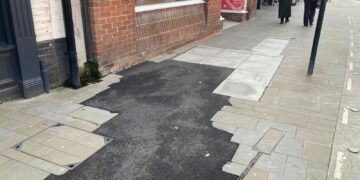Historians looking back on this week will mark it as ‘peak Covid’ – the point in the pandemic where the number of infections started trending down as we learned to respect and then to live with Coronavirus.
Hopefully.
And while the pandemic dominates our everyday actions, locally there’s lots more going on, quite apart from a kerfuffle at a Council meeting.
I’m indebted to the citizen who drew the subject of WBC’s consultations to my attention in mid-January, particularly as it’s a topic where WBC is improving.
Why consult?
There’s two good reasons for public consultations:
Consultations of the first kind seek to understand opinions and gather facts, possibly to get people thinking and talking.
Consultations of the second kind are part of the decision making process. So the quality of the answers is crucial to a decision which benefits people.
Of course, there’s consultations of the third kind … but we don’t do those do we?
Sadly, we do.
When consulting’s a sham
Consultations of the third kind are where the decision’s already made and it’s just going through the motions, before they launch their bright shiny new policy/service/product on an unsuspecting public.
Which then promptly flops …
… because
- it always was a crock;
- lipstick on pigs is cruel;
- dodgy questions deserve dodgy answers;
- we’ve got your number.
Which is probably why last summer’s survey from “honest Bob” Generic on Housing was MHCLG at its finest. The surprise was that our MPs decided the problem would see them pitchforked out of parliament – so they objected.
When consulting is insulting
The learning isn’t hard.
When consultations have leading questions like “would you like lots more houses near you – or even more houses than that?” people get upset.
Giving false options like “would you prefer to pay £15 or £20 extra for all these basic services that you thought you were getting already?” insults the people whose taxes pay your wages/pensions.
And while the examples are exaggerations, if you wanted to learn about a precept consultation that’ll cost you £10 – £30 next year … you’re too late, it closed last week.
We’re late – dash off a survey would you?
There’s nothing like a time-pressured close to get a survey off on the wrong foot. Yet it happens again and again, with some hoping that because there’s so little time, you’ll go along with it anyway.
When this tactic gets used on (or by) our Councillors for some fairly costly decisions, you’ll understand why the word ‘rubbish’ gets applied.
Compare and contrast the following two examples (both real).
Here’s the first:
Your views on our draft objectives
We are proposing the objectives below to build on our commitment to equality to meet the needs of our communities.
- Objective 1. Listen and learn from our communities and use this to deliver services that work well for everyone
I feel this is an appropriate objective for [our] borough.
- Objective 2. Actively champion our commitment to equality, diversity and inclusion and tackle inequality together
I feel this is an appropriate objective for [our] borough.
- Objective 3. Build a diverse and engaged workforce, where everyone is respected
I feel this is an appropriate objective for [our] borough.
Each with tick boxes for :
Strongly agree; Agree; Neither agree nor disagree; Disagree; Strongly disagree.
With a single ‘What could we do to improve them?’ box to write your comments in
And here’s the second:
Please tell us if you think any of the following areas of your day-to-day life have been affected because of your age, disability, gender, race, religion/belief or sexual orientation. If you think it has, it would be helpful for you to give more information about your experiences in the ‘any other comments’ box (Tick as many boxes as apply to you)
Education
Employment
Housing
Transport
Access to health care
Participation in sports and leisure activities
Personal safety
The seven topics each have tick boxes for:
Age; Disability; Gender; Race; Religion / Belief; Sexual Orientation
And each has an ‘Any other comments’ box where you can say more.
The first example gives you three things the Borough’s going to do and asks you to agree.
The second asks you about your daily life in the Borough and whether you’re experiencing any inequality.
One tells you what the Council wants – the other measures what you want.
It’s a stark difference in approach, and in attitude.
‘Best’ – ‘practice’
Wokingham Borough’s currently running three consultations, one of which concerns young people with special educational needs and/or disabilities (SEND).
There’s a draft strategy document which explains the subject and showcases the three-year plan that’s being proposed. While it could be franker, read carefully, it tells you where improvements are being considered.
What’s impressive are the three main questions, asking:
Do you agree that the Outcome Measures and “I statements” will effectively measure that the Strategy and Action Plan is making a difference for children, young people and their families?
Do you have any other Comments about the Outcome Measures, “I Statements” or proposed measures of success for the SEND Strategy?
Do you have any other comments about the draft Wokingham 0-25 SEND Strategy?
The first one’s box ticking (literally) while the last two give you an opportunity to express your views.
Compared to some of WBC’s consultations, this is a big step in the right direction.
Respect.
The last word
Of course, writing strategies and surveys is dead easy.
Actually they aren’t (painful experiences), so bearing in mind we’ve yet to see 2021’s Local Plan consultation …
As local tax-payers, please could we have WBC consultations which focus on resident needs / desires, that publish results openly (with the original survey docs) and where we can see how our contributions were applied (or not)?



















































